September 15, 2020
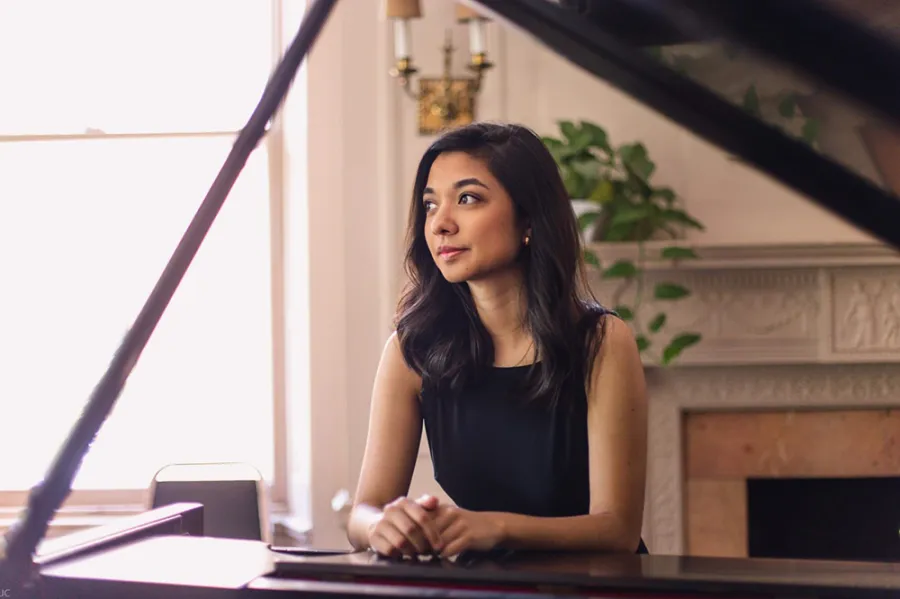
A first-generation student is one whose parents or guardians have not completed a bachelor’s degree; often, they are more broadly defined as a student who is the first person in their family to go college. Either way, it is a population of scholars who may have to overcome unique challenges; among them are heightened risks of financial instability, increased chances of experiencing self-doubt in the academic environment, and a lack of familial (and institutional) support in the technical aspects of preparing for and applying to colleges.1
But of course, no one is defined by the statistics of a category. And as you’ll see, no one adheres perfectly to this very generic picture. Still, the difficulties are important to note so that the stories of the Butler School graduate and undergraduate students presented below can shine through in an accurate light—as those of people who have had to persevere a little more than some of their peers, but have been able to let their incredible talents, love of music and passion for learning carry them through.
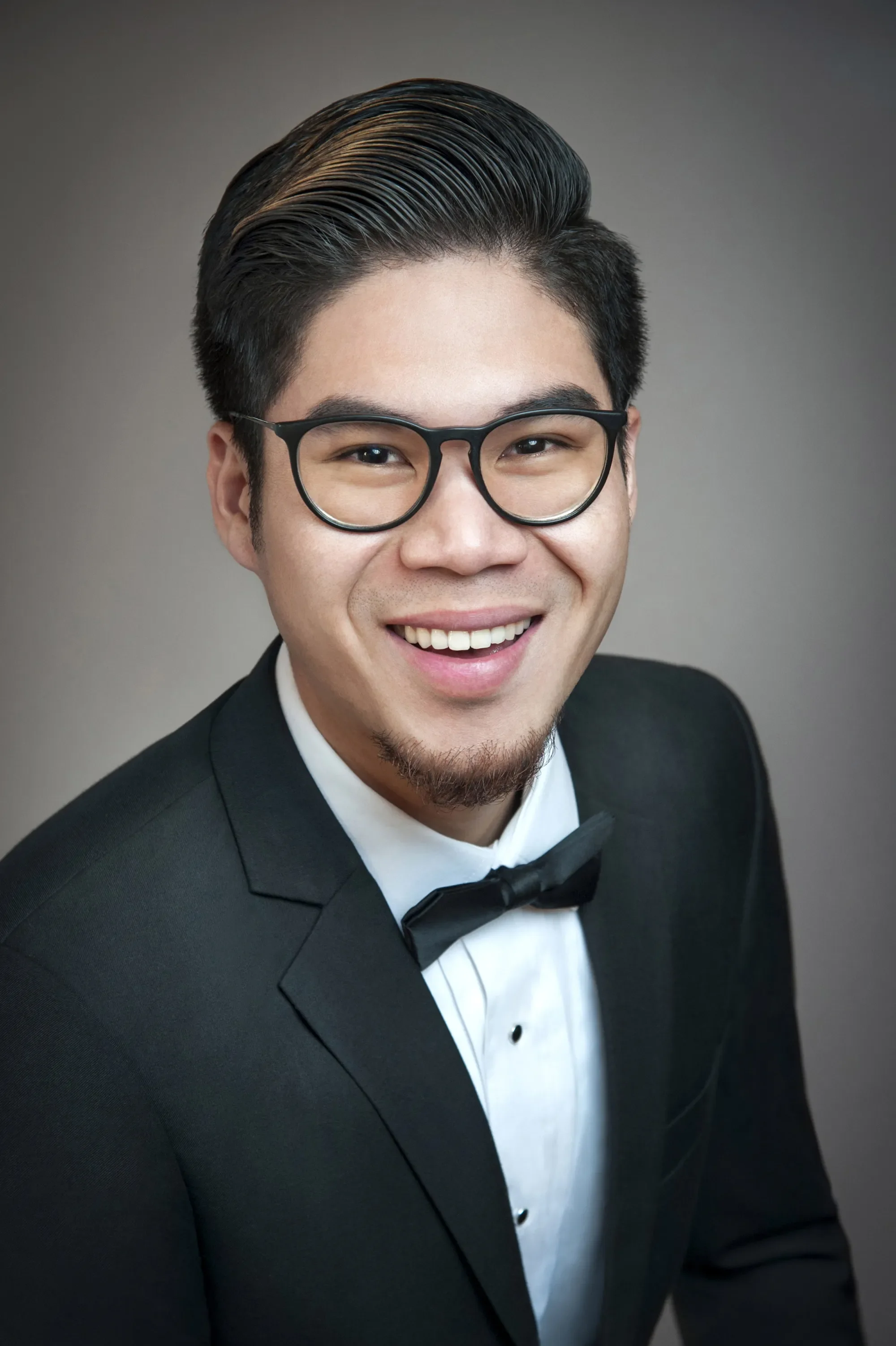
Thanakarn Limtham
DMA 2021, Collaborative Piano
Thanakarn Limtham already knew at ten years old that he wanted to be a professional pianist; it was easy for him to find the passion required for a successful career, but he still needed the structure and discipline. Now, as a doctoral student, he feels that participation in advanced music education has done more than that—acting as a catalyst for character and independence. “I have grown confident from the things that I have learned, and I know that I can use my music to contribute to and help the world in many ways,” Limtham said.
But long before his studies at the Butler School, he found great support in his family and especially from his mother, who was always there to take him to auditions and help him make decisions for his future.
“My mother was a single mom, and she was a fashion designer who worked privately from our home. We were not a wealthy family, so I had to overcome many obstacles in order to study at a university. I give her a lot of credit for standing beside me through everything I decided to do for my career. She has always supported me in my choice to get a degree in music.”
Additionally, his mother was a talented singer, and would sing along when Limtham practiced, encouraging him to play Thai folk songs. “It became our routine to spend musical time together, and I loved every moment of it.”
After years of honing his discipline as a musician, adjusting to undergraduate studies was not a problem. However, the tuition was quite costly; this meant that Limtham had to audition every year for a scholarship, and would have been forced to quit college without it. When he came to the US for his master’s degree, he found a mix of familiar and novel challenges.
“I experienced quite a bit of culture shock. It took me a semester to adjust, but I was fortunate enough to meet many lovely people who helped me not only with improving my English, but also with living my life. The full tuition assistance that I received was vital to my ability to pursue that degree, and I know that many first-generation students experience the same need. Financial assistance is, in my opinion, the most important way to support first-generation students who want to pursue an education.”
As both a first-generation student and international student, Limtham brings many unique perspectives to an academic setting: different opinions, but also different learning methods and ways of approaching the world. But now that studies have temporarily moved online as a response to the COVID-19 pandemic, he is—like most music students and faculty—trying to sort out the brand new challenges to the educational space.
“I just try my best to be flexible, and to do whatever I can to help myself and anyone who is in need. As a piano student, it is very challenging to study online, and I do not have the privilege of practicing on a real piano in my own home. Music is an art form with many topics that simply cannot be discussed effectively online.”
Even through these difficulties, he has found much support at the Butler School through the Collaborative Piano faculty: Dr. Colette Valentine, Dr. Miguel Campinho, Dr. Alex Maynegre-Torra, Professor Rick Rowley, and Professor Patti Wolf. “They are always there to offer advice, moral support, and constructive commentary. I am very happy to be here, and could not be more grateful to work with them.”
For any first-generation university music student that is just starting out, Limtham believes their best tools are perseverance and faith. “Set the goal and go for it,” he said. “I am so grateful that I did not give up on my dream, even when I felt down. You must fight for what you want and, in the end, it will be worth the work and the wait.”
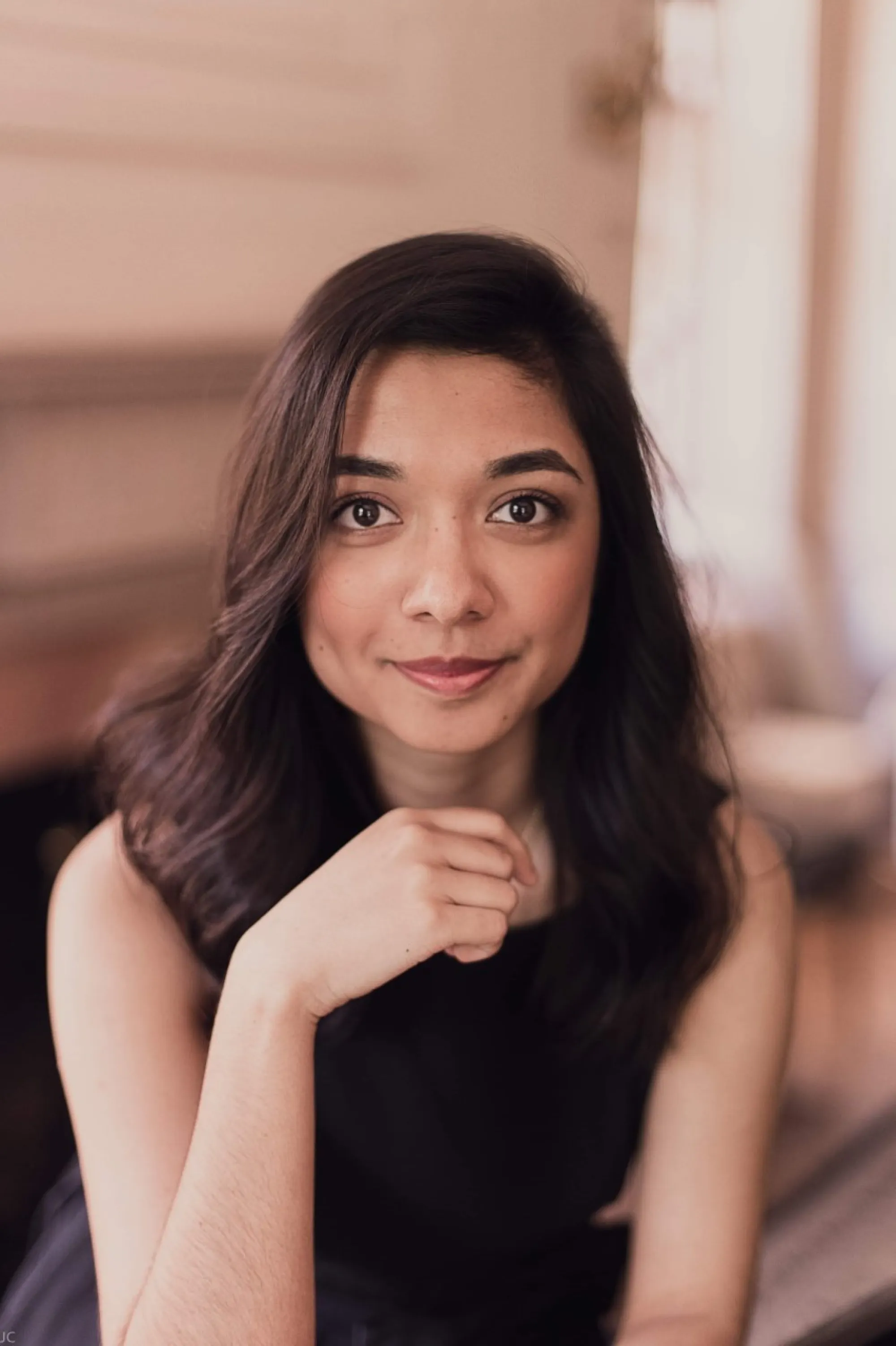
Natasha Talukdar Elam
MM 2021, Opera Coaching
Natasha Talukdar Elam's parents, who immigrated to the US from the Philippines when she was five years old, have been a huge source of support for her journey to higher education. “I am very blessed to say that they are the most hardworking people I know,” she said. “They hoped for a life that would not only bring us happiness, but financial security and less hardship than they experienced in their home countries.”
She believes that choosing music greatly helped her academic career because of the passion she was able to apply to her studies. Although Elam began undergraduate studies as a biology major, she graduated with a Bachelor of Music in piano performance.
“At first, it was difficult for my parents to accept my change in major—but once they saw how much I was thriving in music and how happy it made me, they accepted it pretty quickly. I know that's not a case for some students, so I consider myself lucky in that aspect.”
Although her decision to pursue music as a career didn’t solidify until later, she was just five years old when her parents signed her up for piano lessons in their neighborhood in Queens, NY. “My parents created this passion for me,” she said. “If it wasn't for my father, especially, I wouldn't be where I am today. He pushed me when I wanted to quit and always believed in my abilities, all the way through the end of high school.”
While Elam didn’t find it terribly difficult to adjust to university life, she does think there are ways the experience could be improved for first-generation students, especially for those that learn English as a second language. “I've helped a few friends and tutored them in English through my college and grad school years because they always told me the resources provided to them were not the most helpful,” she added. “I think if faculty and schools were more aware of this difficulty, it would make a huge difference.”
For advice on success to other first-generation music students, Elam deeply emphasizes a combination of hard work and an excellent support system, whether it be friends or family.
“It’s especially hard being a first-generation college student during difficult moments. I always immediately thought about my family, and how many countless sacrifices they made for me to be successful in school. The most painful moments were when I felt that I was not treated fairly by my own teachers at times, the people who you put all your trust in for your development. But things always get better. Find that support system. Find the people that believe in you no matter what.”
Through working hard and never giving up, she was able to find an important mentor and teacher in the Butler School’s Dr. Tamara Sanikidze, through a summer program audition.
“I was completely exhausted and struggling during the last year of my master’s, and was really questioning my abilities as a pianist. If it was not for Dr. Sanikidze and our conductor Douglas Kinney Frost, I would not be where I am today. They both believed in me from the beginning and were sensitive to my struggles before I came to UT. Through our individual coachings and opera rehearsals, they always paid attention to what I needed improvement on, and what my strengths already were.”
Elam feels that in just the last year of studying with them, her sense of confidence as a person and as a musician has drastically improved. “The sense of community that they foster—and all of the Butler School fosters—is one that should be fostered in all universities and music schools.”
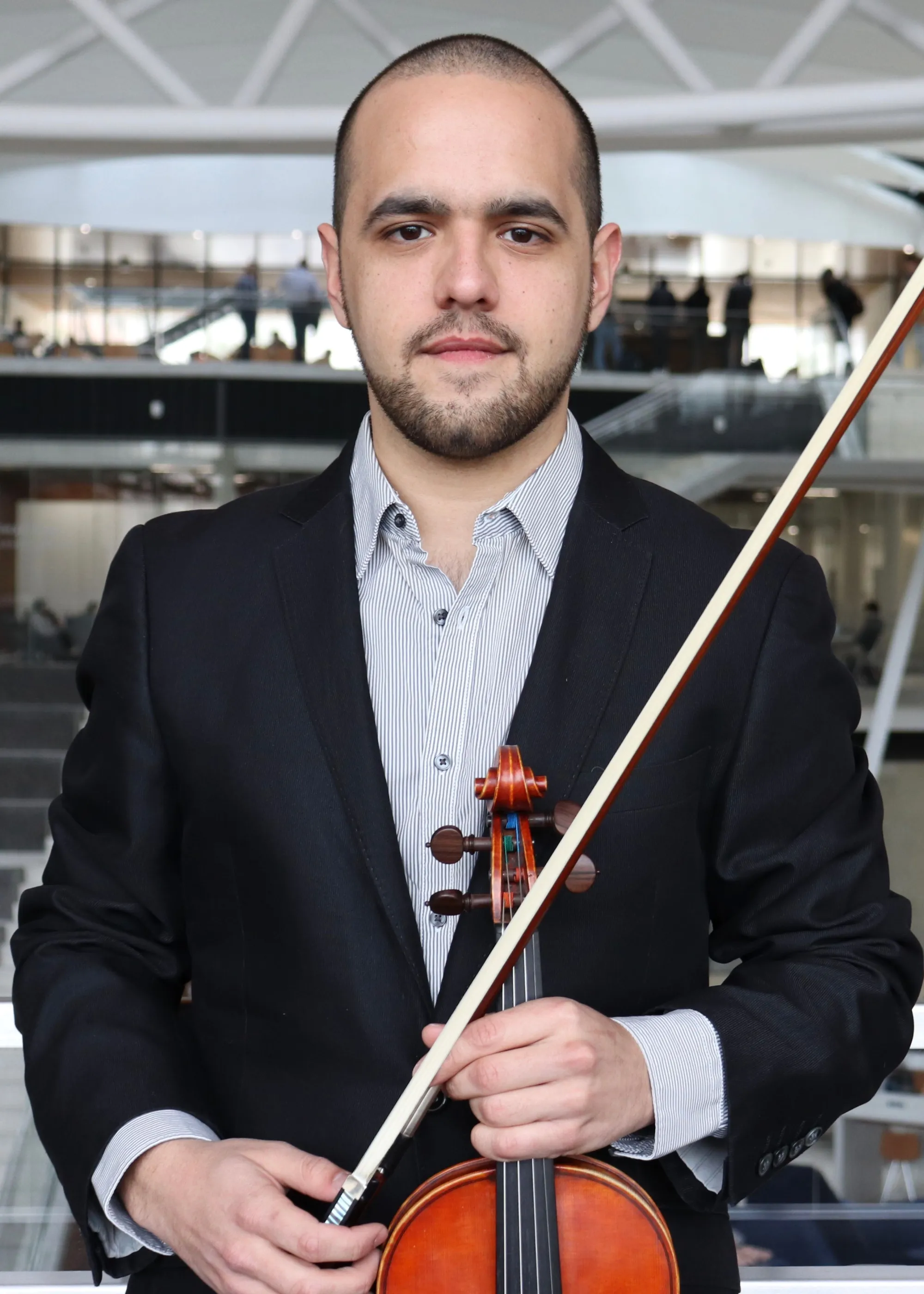
Nicolás Medina Gutiérrez
BM 2021, Music Performance, Violin
Before Nicolás Medina Gutiérrez came to the US, he was able to participate in Venezuela’s orchestra program, known as El Sistema, which provides free music education and instruments to children and adolescents.
“I started taking violin lessons when I was in third grade. My family—particularly my mom—have always been fans of classical music, so they really encouraged me to take it seriously. After finishing high school, I got a job in one of the leading orchestras from El Sistema and had the opportunity to develop a career touring around the world, playing in the most iconic music halls, and performing with the best conductors.”
He didn’t consider getting a degree after high school; his job was already very competitive and time-consuming. However, he eventually realized the importance of college degrees outside of Venezuela, which led to his decision to apply to the Butler School. Gutiérrez feels that his time here has already made him become more passionate about accessibility and equality in the arts. “Since it has definitely defined my life,” he said, “I think everyone deserves the same chance regardless of their economic background.”
He found his freshman year at UT to be extremely challenging. All at once, he had to get used to a new language and a new culture, in addition to the sometimes labyrinthine administrative side of academia. “I was suddenly taking a bunch of classes, practicing, working; all this while dealing with the fact that I was completely alone in a new country.”
But Gutiérrez knows what it means for him to be present in a university setting—not only for himself, but for his colleagues.
“I think my story can help people understand that there’s not only one way to do things in life. You are highly shaped by your environment, not only your decisions. I want other students to understand that a lot of people don’t have the same opportunities that they do. My parents couldn’t go to school because they needed to work to make ends meet. I am now able to do it because of the support of an overwhelming amount of people in my life.”
He also offers a unique perspective on the online learning that has been necessary during the COVID-19 pandemic. “I personally enjoy remote studies,” he said. “I am aware that it has been extremely challenging for educators and other students, but I really appreciate the fact that I can have English subtitles in my classes, go back if I missed a point, learn from any place in my home, and do this all whenever I can.”
Gutiérrez acknowledges that it is hard to focus and stay productive during a global pandemic, but feels grateful to receive education and have his physiological needs covered at this time. “This Is not true for a lot of people around the world right now, and I personally know many of them.”
As is not uncommon for first-generation students, he is several years older than most of his undergrad classmates, but stresses that this has not hindered him in the slightest.
“The fact that I had a job without getting a degree first provided me a different path than most people. I wouldn’t change anything about my professional life, and I want people to understand that there is nothing wrong with going to college at an older age, even in music.”
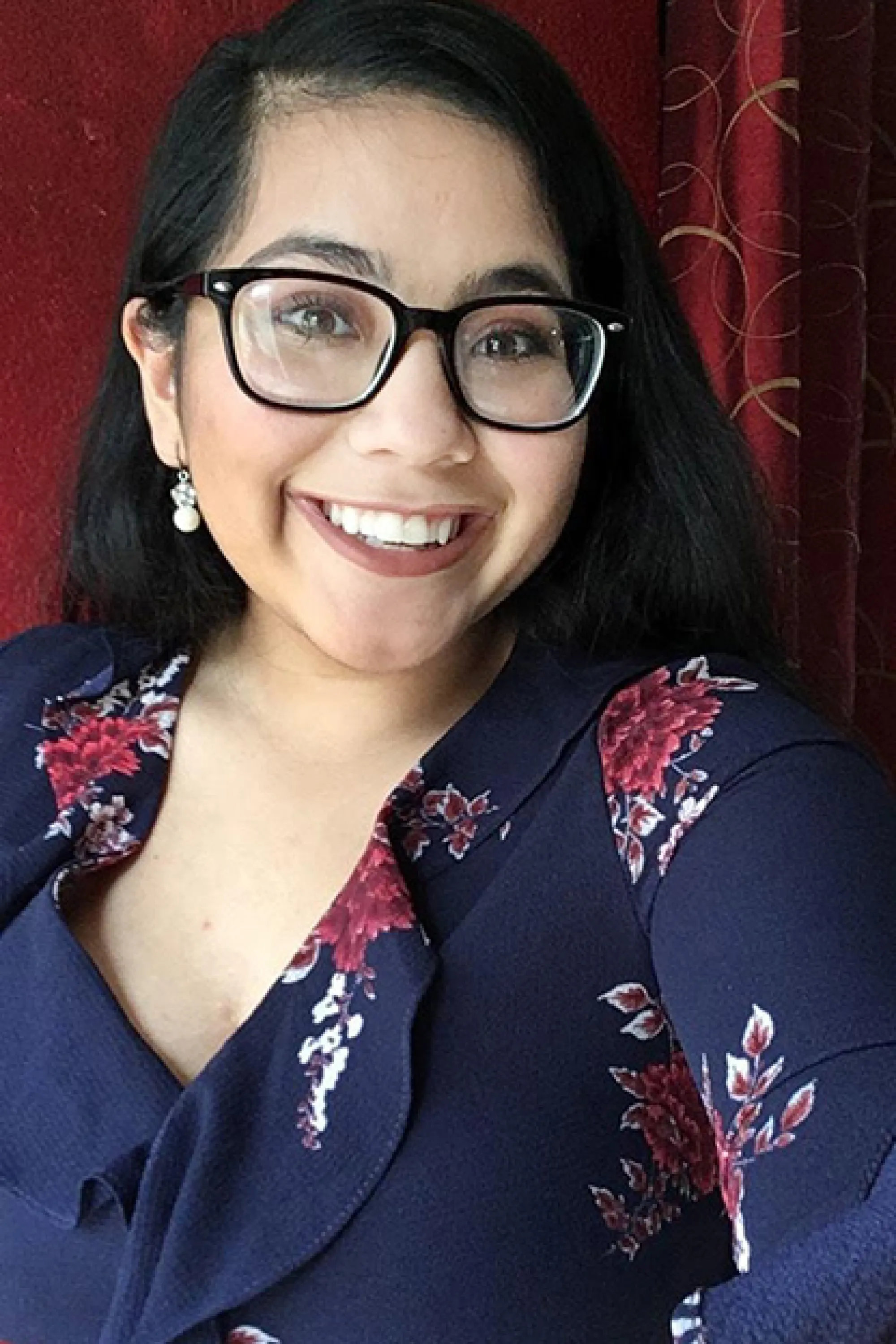
Veronica Lopez
BM 2021, Choral Music Studies
As a baby, Veronica Lopez would not stop crying until her mother sang to her. In elementary school, she gravitated toward music, always staying after school to do “all the extra things.” But for a while in middle school and high school she was tempted to become a math teacher, and in fact almost accepted a full scholarship at Texas State from the education department. In the middle of that interview she blurted out, “I’m so sorry, but I can’t do this. I need to be in music, I can’t lose it.” This epiphany hit in September, fairly late in the admissions calendar for a musician, so she had to scramble—thanks to a lot of help from her choral director and her voice teacher (with whom she’d only been studying a few months) to get her application and prescreen video ready for the Butler School.
Veronica says that her family wasn’t 100% on board with this change in direction, especially her mother, and that her sister still makes occasional cracks about how she won’t make any money—“but money is not the payoff for me, anyway.” Her family better understands her choice, however, each time they hear her sing.
Her first semester at UT was a learning experience, she says. “I struggled at the beginning, because I came from a predominantly Hispanic high school. My two friends and I were the first three voice majors from Akins High ever to be accepted to the Butler School. I felt like I was always running just behind my classmates: other people had been taking lessons for years, they were very much immersed in the world of classical music and spoke the language. It was definitely a culture shock.”
Inspiring and supportive professors helped to smooth the way. Veronica singles out Dr. Suzanne Pence and Dr. Margie Yankeelov as “two powerful women, amazing and phenomenal. They are wonderful advocates for students. If they don’t have the answer, they’ll find it for me.” She plans to be that kind of mentor, one who inspires students and creates a space where they can learn about and be exposed to all kinds of music, where they can follow their passions while being supported and gaining confidence, where they can ask any question at all.
In this upside-down time for all performing artists, Verónica is optimistic. “We are all craving human interaction and performance opportunities with other people, so it’s forcing us to be more creative, forcing us to learn more about the technologies related to music. There are so many applications that we didn’t know about until now. If somebody can’t come in to rehearsal, they can be there remotely. My professors are saying wow, I figured out a new way to teach this concept. They’re coming to grips with their priorities, with what is really most valuable for their students to learn.”
She hopes other first-generation college students considering a major in music will follow their hearts. “Go for it, if it’s really what you want to do. People are more than willing to help: professors, friends, even strangers. Reach out, even though it’s difficult and might feel embarrassing. Ask questions of students who are already there, already doing it: what advice do you have as I prepare my application? How should I approach my audition?”
Verónica Lopez will answer your questions. She’s ready to pay it forward.
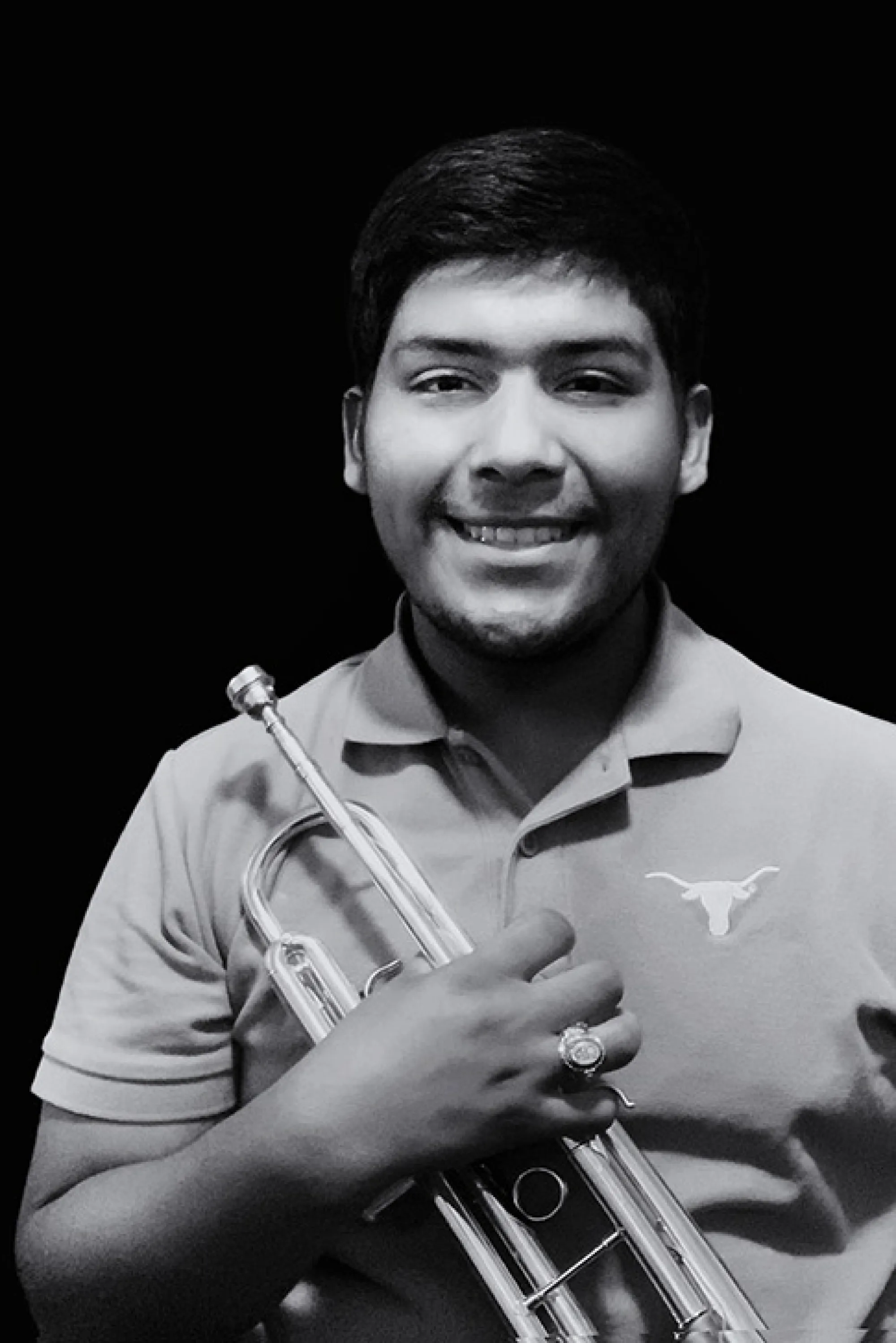
Jairo Cabrera
BM 2021, Instrumental Music Studies, Trumpet
Jairo Cabrera first realized that it was possible to make music a profession in the seventh grade. He says:
I remember walking into the band room and asking my band director, “what do you do for money?” (It’s important to understand that my parents work a lot, at a dry cleaner, so it never occurred to me that you could make a living in music. The adults I knew best were my parents, and they were always worried that something bad would happen to us even though they were here legally, so we stayed mostly in the house for fear of being deported. In my mind, you had to work in the grocery store or the dry cleaner or someplace like that.) My band director laughed and said, “I make money directing you guys. You can have my job, it’s totally doable.” That’s when I decided my life has to have something to do with music. I couldn’t believe it. I thought it was the coolest thing ever.
Jairo’s family thought music was just a phase, a middle school thing, though he kept telling them that he wanted to be a musician for real. They said, “That’s nice.” They thought he was crazy for leaving the house at 6 a.m. for marching band practice, leadership, sectionals, all this extra stuff. He knew that his mom meant this with love, but she said, “do something bigger, be an engineer.” She was definitely wondering when this music thing was going to run its course.
When Jairo went to San Antonio for All-State Band, his mother said, “I know they’re going to bill us for something.” She couldn’t believe that it would be free. After All-State, she began to understand that Texas might actually support music making. Jairo says, “My dad was always cool about it; he just said you’ve got to work at it, whatever you do. Because they don’t like to leave home, Mom has only been to campus once. But she took a thousand pictures and was so excited. Now she’s very supportive.”
Jairo found it tough to adjust to UT at first: it was actually hard to get used to the amazing people around him. He couldn’t believe how welcoming everyone was. He says, “These are world-changers; I was in awe. Professor Junkin is standing right there, and he’s been my hero since middle school. The high quality of the people around me did cause me stress but I did that to myself, that was all me. My advice to any transfer or community college student is: don’t put yourself in that box.”
Jairo has taken much from his colleagues and teachers; he reflects that “Iron sharpeneth iron.” Dr. Bob Duke has definitely inspired him: “He lives what he says, what he teaches. You can apply it to anything in your life, not just music. It feels like a super power, especially this last year. It works.” Jairo has so much confidence in the quality of his education at UT that he hardly worries about post-pandemic opportunities. “If there’s one place I want to be, it’s here. Every faculty member is doing the best they can do.”
He sees the challenges of COVID-19 as having created greater resilience among music students. “This has definitely pushed us to be more independent. We’re not waiting around for a teacher to tell us what to do. It’s forcing us to do this for ourselves, and it’s revealed who’s in it for themselves and who’s not. I need to do music, because I have to. I’m so lucky that in my sophomore year (of high school) Professor Junkin gave us The Talk: ‘this music thing is really hard. Choose it only if you can’t imagine doing anything else.’”
You can learn more about The University of Texas at Austin’s efforts to support first-generation students at firstgeneration.utexas.edu

